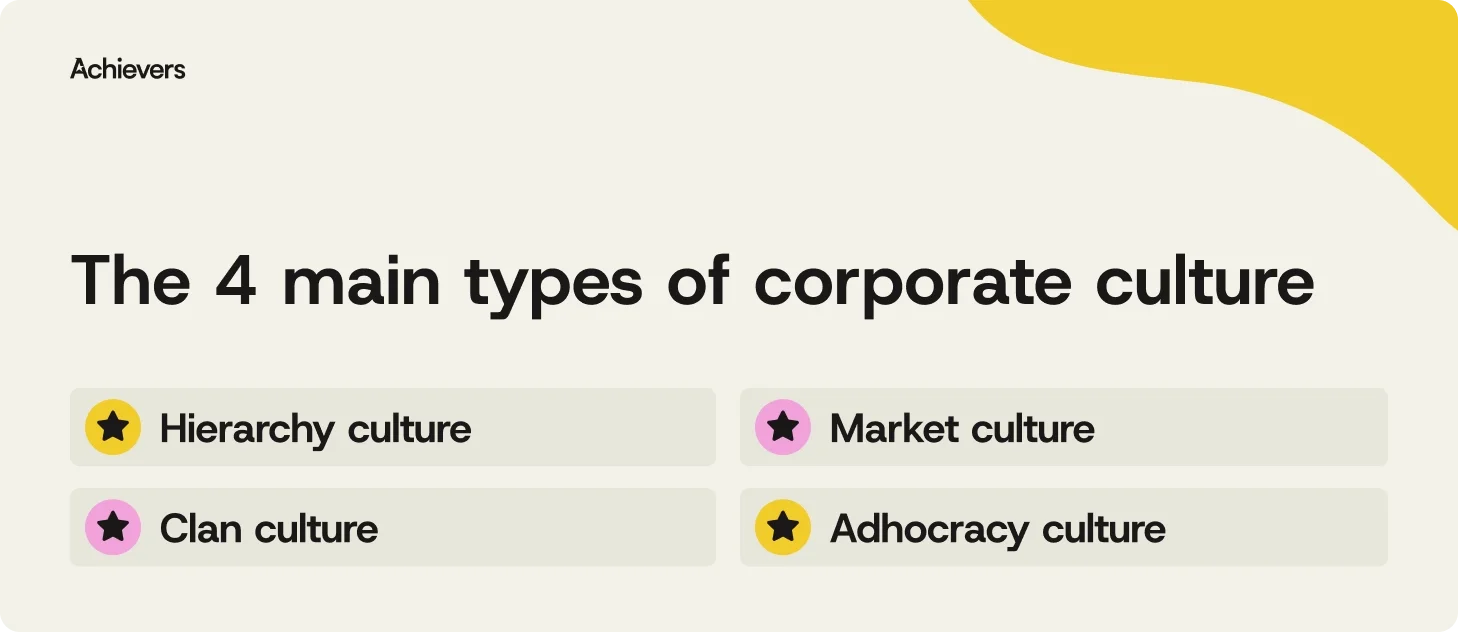Table of contents
Create a culture that means business™
Schedule a demo with an Achievers solution expert today.
The best corporate culture examples don’t start with a mission statement. They start with everyday choices. Strong cultures are built, brick by brick, through deliberate effort and a clear understanding of what people need to thrive. And while perks and posters are easy, building a culture people want to be part of? That takes more.
When employees feel aligned with a company’s values, they’re not just more likely to stick around — they’re more likely to show up fully. According to Gallup, companies with strong cultures saw an 85% net profit increase over five years — not to mention a 23% increase in profitability.
Culture isn’t a side project. It’s the foundation for how people work, connect, and grow. The corporate culture examples ahead show how leading organizations are getting it right — and how you can turn culture into a competitive edge.
15 best corporate culture examples of 2026
We’ve short-listed the top 15 best corporate culture examples among organizations today:
1. Achievers
Achievers is on a mission to change the way the world works — by making work feel more human.
That mission shows up in how they treat their people. Recognition isn’t reserved for big milestones or annual reviews. It’s part of daily life, woven into an employee recognition platform that encourages everyone to call out great work, right when it happens. Employees don’t just give feedback — they help shape the culture through a Voice of Employee tool that leaders actually use to take action.
At the core of it all: values that guide real behavior, not just posters on a wall.
- It’s the people: Inclusion isn’t a statement — it’s a shared practice. Everyone’s voice matters, and every win is a team win.
- Be bold: Experimentation is encouraged. Risk-taking is part of how progress happens.
- Own the outcome: People are trusted to take initiative, follow through, and learn from what works — and what doesn’t.
- One team: Silos don’t stand a chance. Collaboration and open communication keep the work — and the culture — moving forward.
- Win with customers: Success isn’t one-sided. The best outcomes happen when customers grow alongside the team.
The culture at Achievers isn’t built around perks — it’s built around purpose. By recognizing people often and listening with intention, Achievers creates a workplace where employees feel seen, heard, and genuinely connected to the mission.
2. Patagonia
Patagonia’s culture is built around action, not slogans. The company lives its values — building quality products, protecting the planet, and using business as a force for good. Employees don’t just talk about sustainability; they’re empowered to contribute to it, whether through two-month paid environmental internships or day-to-day decisions that reduce harm.
3. The Body Shop
At The Body Shop, ethics and community aren’t side campaigns — they’re core to how the business runs. The company leads with fair trade practices, responsibly sourced ingredients, and a long-standing commitment to human rights and animal welfare. That focus on doing good shows up in the culture, too — people are encouraged to stand for something and contribute to change, inside and outside the business.
4. Pixar
Pixar’s culture is designed to unlock creativity. The company has long focused on tearing down silos, encouraging open feedback, and building trust through collaboration. Daily team reviews, or “dailies,” help ideas evolve in real time, while “brain trusts” of directors and peers offer candid input without ego. It’s a structure that makes room for storytelling — and the people behind it — to shine.
5. Google
Google’s culture is driven by a clear mission: to make the world’s information useful and accessible. But it’s the way that mission is lived day to day — through experimentation, autonomy, and a bias toward action — that keeps the culture dynamic. Employees are encouraged to move fast, think big, and solve problems with a sense of purpose.
6. Zappos
Zappos’ company values include “Create fun and a little weirdness” and “Be adventurous, creative, and open-minded,” which tell you almost everything you need to know about what it’s like to work there. Service is taken seriously. Everything else? Open to reinvention. Zappos even created a dedicated team — Zappos Insights — to help other organizations learn from their approach.
7. Sky
Sky’s values are grounded in respect, creativity, and fairness — not just in how people work, but how they treat one another. Collaboration is encouraged, integrity is expected, and inclusion is part of the job. They promote forward-thinking and doing the right thing, even when it’s not the easiest route.
8. Spotify
Spotify knows that the music industry doesn’t stand still — and neither should its people. Its “Band Manifesto” lays out values like innovation, sincerity, and playfulness, while reminding leaders that their role is to guide the band, not control it. Employees are given room to experiment, speak up, and stay curious — all while staying true to the rhythm of what makes Spotify stand out.
9. Netflix
Netflix focuses on performance, candor, and impact. Employees are expected to work with radical honesty, high accountability, and independence. It’s not about fitting in; it’s about leveling up. As former Chief Talent Officer Patty McCord put it, “We’re not family.” And that clarity is exactly what makes Netflix’s culture work for the people who thrive there.
10. Telstra
Telstra’s culture is shaped by its purpose: creating a connected future where everyone can thrive. That shows up in how they support their people — from mental health initiatives and flexible work options to mentorship and above-average pay. The company prioritizes well-being alongside performance, creating a workplace where employees have the space and support to succeed.
11. Atlassian
Atlassian is upfront about what it values — and who will succeed there. Openness, teamwork, curiosity, and customer focus guide the way people work and how the company hires. Their culture isn’t designed to please everyone. It’s designed to attract people who are ready to challenge ideas, own their impact, and grow with change.
12. Workday
At Workday, culture starts with care. Well-being, transparency, and feedback are part of the everyday — not just an annual check-in — supported by regular employee input and seamless integrations with Achievers. The values are simple: do what’s right, keep learning, and have some fun. It’s a place where people feel heard, and where feedback drives real change.
13. HubSpot
HubSpot’s culture code is more than a deck of slides — it’s how work gets done. Employees are trusted with autonomy, encouraged to own their results, and supported in building careers with purpose. Transparency is a given. So is learning. From flexibility to professional development, HubSpot puts people in charge of how they grow — and gives them the tools to do it.
14. Salesforce
Salesforce calls its approach the Ohana Culture — but it’s more than a slogan. The company puts well-being, trust, and equity at the center of how it works. Employees have access to mental health support, flexible schedules, and a range of benefits that reflect real needs. Resource groups foster connection and inclusion, while the 1-1-1 philanthropic model reinforces a broader sense of purpose.
15. Costco
Costco’s culture is proof that putting employees first is good business. Fair wages, internal promotions, and low turnover all stem from a simple approach: treat people well, and they’ll stick around. The company offers healthcare to part-time staff, strong retirement benefits, and a clear path to advancement.
What are the 4 main types of corporate culture?
Every workplace has a culture, whether it’s carefully crafted or simply grown over time. Most fall into one of four categories, according to research from Kim Cameron and Robert Quinn at the University of Michigan:

- Hierarchy culture: Structured, stable, and process-driven. These organizations rely on clear chains of command, defined roles, and efficient systems to keep things running smoothly. Consistency matters more than speed, and predictability is part of the plan.
- Clan culture: People come first. These organizations emphasize collaboration, transparency, and strong internal relationships. Leaders act more like coaches, and success is rooted in trust, morale, and shared purpose.
- Market culture: All about outcomes. Market cultures focus on competition, growth, and measurable results. Goals are aggressive, feedback is direct, and recognition tends to follow performance. It’s fast, focused, and high-pressure by design.
- Adhocracy culture: Built for innovation. These organizations thrive on bold ideas, experimentation, and adaptability. Employees are encouraged to challenge the status quo — and failure is seen as a step toward something better.
What is the best type of corporate culture?
The best corporate cultures aren’t built overnight. They’re shaped through everyday actions, not just values on a PowerPoint slide. While no two cultures look exactly the same, the strongest ones tend to have a few things in common:
- Purposeful leadership: Leaders set the tone. When they communicate clearly, lead with empathy, and live the values they expect from others, culture follows.
- Genuine engagement: When people feel connected to their work — and to the company — they show up with more energy, focus, and commitment.
- Open communication: A culture of transparency builds trust. Honest conversations, clear expectations, and feedback that flows both ways make teams stronger.
- Inclusion and belonging: Diversity matters — but inclusion is what makes it stick. The best cultures make sure everyone feels respected, heard, and part of something meaningful.
- Support for well-being: Great cultures look out for people. That means caring about mental health, work-life balance, and creating space to recharge without guilt.
- Recognition that matters: Appreciation shouldn’t be an afterthought. Regular, meaningful recognition reinforces the behaviors that build culture — and keeps people motivated.
- Room to grow: When employees have access to development, mentorship, and internal mobility, they’re more likely to stay — and bring others with them.
Let today’s corporate culture examples inspire your organization
Great corporate cultures are built in the moments that show people they matter: a well-timed thank-you, a space to speak up, a leader who listens and follows through. That means more than just having a values slide or annual survey. It means creating space for real recognition, real feedback, and real connection.
That’s where Achievers comes in. Our science-backed platform helps organizations build cultures that drive results — by changing behavior through frequent, meaningful recognition and giving employees a voice that leads to action. With 2x the recognition frequency, 5x the engagement impact, and the deepest software integrations in the industry, we make it easy to bring your culture to life, every day.
We help organizations do more than talk about belonging — we help them build it.
Corporate culture examples FAQs
Key insights
- Strong cultures are built through daily actions, not statements or perks.
- Values-driven alignment boosts engagement and profitability.
- Inclusive, transparent cultures empower people to do their best work.



